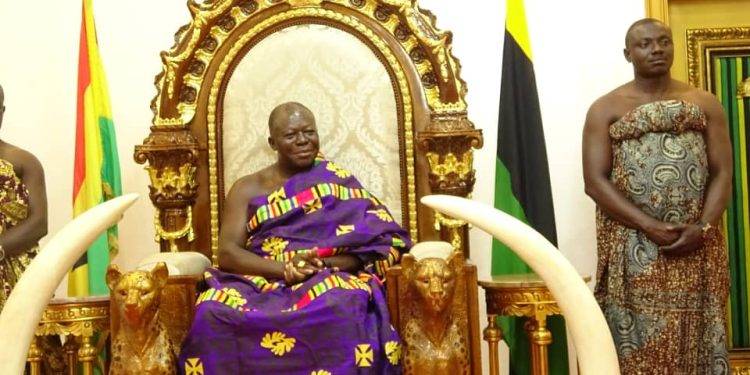Asantehene Otumfuo Osei Tutu II, the revered traditional leader of the Ashanti Kingdom, has made a bold statement on the need for a more proactive approach to regional development, independent of political influence. Speaking during a courtesy visit by the World Bank Vice President for Western and Central Africa, Otumfuo stressed the critical role of infrastructure and the necessity for a collaborative social contract to drive progress in the Ashanti Region and beyond.
A Call for Pragmatic Development
The Asantehene expressed his dissatisfaction with relying solely on politicians for the region's developmental needs. He emphasized that sustainable development requires consistent effort and accountability, which cannot be guaranteed through political promises alone.
“In terms of development, if we have the infrastructure, everything will be fine. I cannot depend on the politicians for my development,†Otumfuo stated firmly.
He further proposed a novel approach—a "social contract"—to ensure that development efforts are inclusive, transparent, and results-oriented. This contract, he suggested, would create a framework where all stakeholders, including traditional leaders, private entities, and civil society, play active roles in advancing the region's progress.
“I don’t want to depend on them [politicians], so let’s have a social contract and then we do it,†he added.
Infrastructure as the Backbone of Progress
Otumfuo Osei Tutu II underscored the significance of infrastructure in transforming the socio-economic landscape of the Ashanti Region. He noted that well-developed infrastructure, including roads, healthcare facilities, educational institutions, and reliable utilities, is fundamental to improving the quality of life and attracting investments.
The Asantehene’s comments resonate deeply with ongoing challenges in Ghana, where infrastructure deficits continue to hinder development. Poor road networks, inadequate healthcare services, and unreliable electricity supply remain pressing issues in many parts of the country, including the Ashanti Region.
Partnerships Beyond Politics
The Asantehene’s interaction with the World Bank Vice President highlights his vision for leveraging global partnerships to address local challenges. The World Bank has long been a key player in Ghana’s development, providing financial support and expertise for various projects.
During the meeting, Otumfuo called for stronger collaboration between international organizations and local authorities to ensure that development projects align with the region's specific needs. He emphasized the importance of moving beyond the constraints of political cycles to create lasting impacts.
This approach aligns with the World Bank's strategy of fostering community-driven development and empowering local leaders to take charge of their destinies.
Lessons from the Past
The Asantehene’s remarks also reflect a broader frustration with the pace of development in Ghana, often stifled by political inertia and bureaucratic delays. Over the years, successive governments have introduced ambitious plans for national development, yet implementation has often fallen short due to changing political priorities and insufficient resources.
Traditional leaders like Otumfuo Osei Tutu II, who wield significant influence and command respect across various communities, have increasingly taken on advocacy roles to push for tangible results. Their involvement bridges the gap between grassroots communities and policymakers, ensuring that development initiatives are both inclusive and effective.
Empowering Communities
Otumfuo’s call for a social contract is particularly timely, as it places emphasis on empowering communities to take ownership of their development agendas. By fostering partnerships among traditional authorities, private sector players, and non-governmental organizations, the proposed model would ensure that resources are allocated efficiently and projects are completed on schedule.
This approach also encourages transparency and accountability, reducing the risk of corruption and mismanagement that often plague large-scale projects.
A Vision for the Future
The Asantehene’s vision extends beyond immediate concerns to encompass long-term goals for sustainable growth. He envisions a region where development is driven by collective effort and not reliant on the goodwill of politicians.
This philosophy aligns with global best practices in sustainable development, which prioritize stakeholder engagement, resource optimization, and resilience against external shocks. By championing this approach, Otumfuo Osei Tutu II is positioning the Ashanti Region as a model for other regions in Ghana and across Africa.
Broader Implications
The Asantehene’s remarks come at a time when Ghana faces critical developmental challenges. From rising unemployment to an underperforming economy, the need for innovative solutions has never been greater. Otumfuo’s call for action serves as a wake-up call to policymakers, urging them to prioritize the welfare of citizens over partisan interests.
His proposal for a social contract could potentially redefine how development is approached in Ghana, shifting the focus from short-term political gains to long-term community benefits.
Conclusion
Asantehene Otumfuo Osei Tutu II’s candid remarks underscore the urgent need for a paradigm shift in how development is conceptualized and executed in Ghana. By advocating for a social contract and emphasizing the importance of infrastructure, he has set the stage for a more inclusive and sustainable approach to progress.
His leadership serves as a powerful reminder that true development is a collective effort, requiring the active participation of all stakeholders. As Ghana moves forward, the Asantehene’s vision offers a roadmap for achieving meaningful and lasting change.




No comments yet
Be the first to share your thoughts!